
- Retrait gratuit dans votre magasin Club
- 7.000.000 titres dans notre catalogue
- Payer en toute sécurité
- Toujours un magasin près de chez vous
- Retrait gratuit dans votre magasin Club
- 7.000.000 titres dans notre catalogue
- Payer en toute sécurité
- Toujours un magasin près de chez vous
The Moral Property of Women
A History of Birth Control Politics in America
Linda GordonDescription
Gordon puts today's reproduction control controversies--foreign aid for family planning, the abortion debates, teenage pregnancy and childbearing, stem-cell research--into historical perspective and shows how the campaign to legalize abortion is part of a 150-year-old struggle over reproductive rights, a struggle that has followed a circuitous path. Beginning with the "folk medicine" of birth control, Gordon discusses how the backlash against the first women's rights movement of the 1800s prohibited both abortion and contraception about 130 years ago. She traces the campaign for legal reproduction control from the 1870s to the present and argues that attitudes toward birth control have been inseparable from family values, especially standards about sexuality and gender equality.
Highlighting both leaders and followers in the struggle, The Moral Property of Women chronicles the contributions of well-known reproduction control pioneers such as Elizabeth Cady Stanton, Margaret Sanger, and Emma Goldman, as well as lesser- known campaigners including the utopian socialist Robert Dale Owen, the three doctors Foote--Edward Bliss Foote, Edward Bond Foote, and Mary Bond Foote--the civil libertarian Mary Ware Dennett, and the daring Jane project of the 1970s, in which Chicago women's liberation activists performed illegal abortions.
Spécifications
Parties prenantes
- Auteur(s) :
- Editeur:
Contenu
- Nombre de pages :
- 464
- Langue:
- Anglais
Caractéristiques
- EAN:
- 9780252074592
- Date de parution :
- 12-03-07
- Format:
- Livre broché
- Format numérique:
- Trade paperback (VS)
- Dimensions :
- 153 mm x 236 mm
- Poids :
- 653 g







